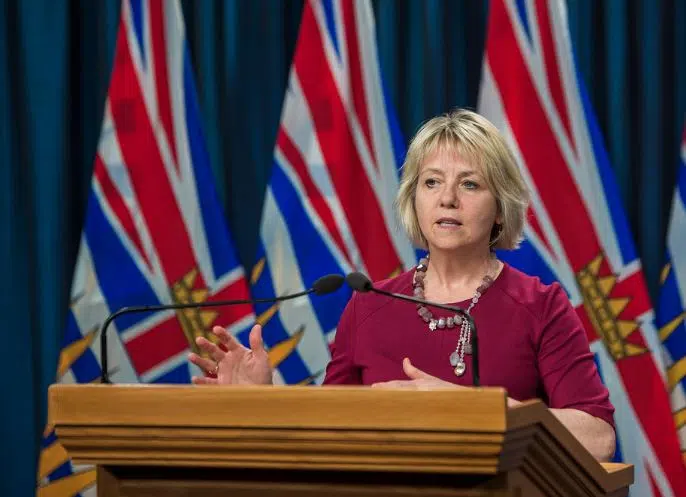
Dr. Bonnie Henry during a COVID-19 update briefing. (Photo via BC Government)
B.C.’s top doctor is defending the decision to allow for a 35-day gap between the first and second dose of the COVID-19 vaccine instead of the manufacturer-recommended 21 to 28 days.
Dr. Bonnie Henry says the move is backed by science and will help maximize the vaccine’s distribution, noting the delay will allow the province to vaccinate another 150,000 high-risk people.
“The World Health Organization (WHO) and the National Advisory Committee on Immunization (NACI) now have extended the interval, the recommended interval for doses to 42 days, recognizing that that was perfectly safe and effective in the vaccine trials.,” she said. “We use that information along with our supply to try and get a nice safe and effective way of providing as much immunization as we can to high risk groups during a safe and effective period.”
Henry says the first dose of the vaccine primes the immune system in the human body, while the second shot gives it a boost and waiting between jabs allows the body to build up that immunity.
“There was no difference between the people who got it at day 19 and the people who got it at day 42 in how well the vaccine worked after the second dose and there was no decrease in protection between the first dose and the second dose,” Henry said, referencing data from vaccine trials.
Two separate groups – the Doctors of B.C. and the BC Nurses Union have been calling on the province to reverse its decision to delay the second doses of the COVID-19 vaccine, arguing the move is unscientific, unsafe and unethical.
B.C. has run out of its supply for the Pfizer-BioNtech vaccine – 50,700 doses – while another 20,500 doses of the Moderna vaccine have been distributed. Henry says new shipments are expected by Thursday.
As of yesterday, 59,902 people had been vaccinated against COVID-19 in the province, with people more likely to die or be hospitalized from the virus the focus of the immunization campaign right now.
“Let me be clear, everybody will have their turn,” Henry added, noting there is a limited amount of vaccine that is coming between now and the end of March.
About 10 per cent of the population should be vaccinated by Mar. 31, with details on who will be vaccinated and when expected to come later this month.
More Vaccines Coming: PM Trudeau
Prime Minister Justin Trudeau says Canada has reached an agreement to purchase another 20 million doses of the Pfizer-BioNTech COVID-19 vaccine.
It brings the total number scheduled to arrive this year from two approved vaccine makers – Pfizer and Moderna – to 80 million – enough to vaccinate the entire Canadian population according to the required two-dose regimen.
“From our agreements with Pfizer and Moderna alone…we are on track to have every Canadian who wants a vaccine receive one by September,” Trudeau said this morning.
“We’re going to continue working to see if we can get a few more doses, because all Canadians want this to move forward as quickly as possible.”













Comments